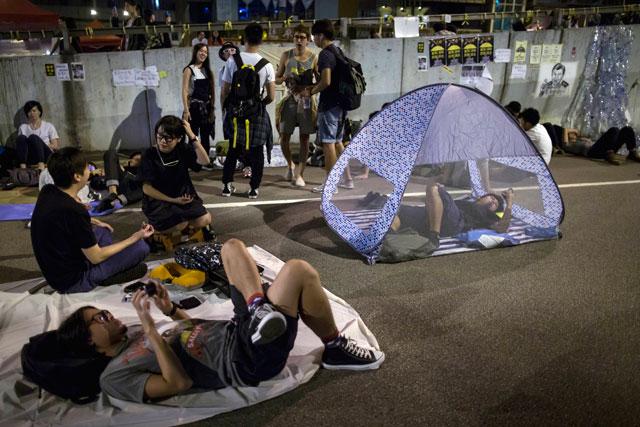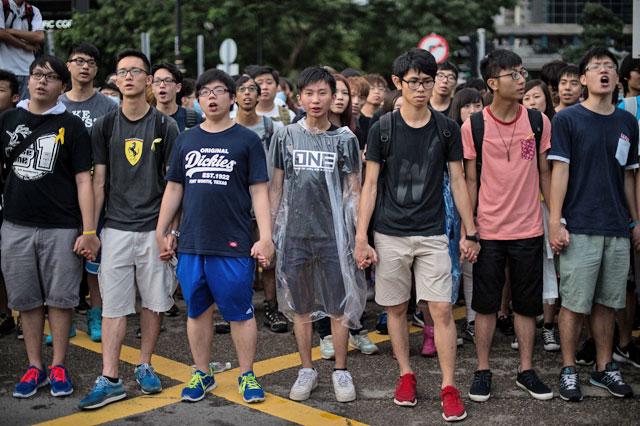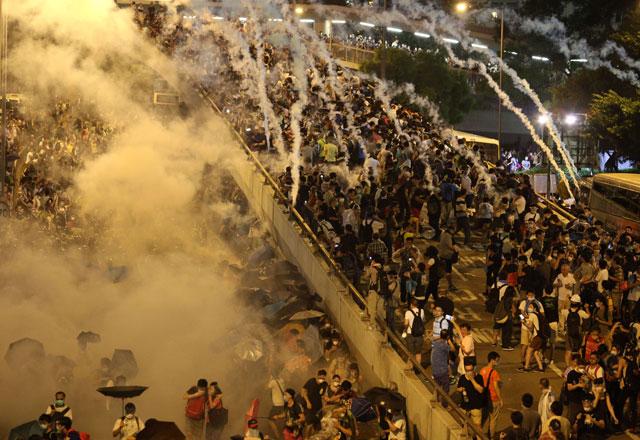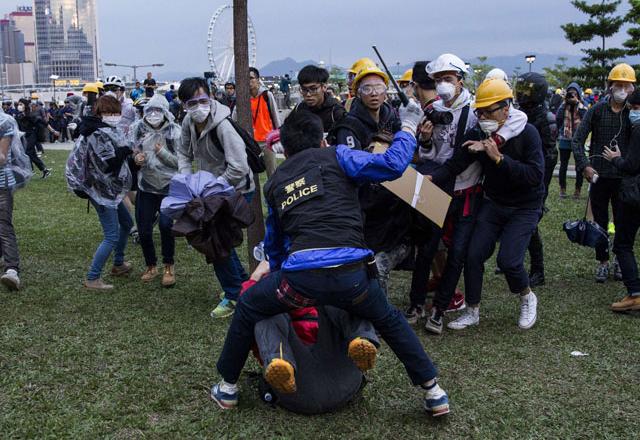You are here
Pitching tents, Hong Kong democracy protesters dig in for long haul
By Reuters - Oct 11,2014 - Last updated at Oct 11,2014

HONG KONG — Hundreds of student activists camped overnight at major protest sites in Hong Kong as the democracy movement sought to re-gather momentum after the government called off talks on defusing unrest in the global financial hub.
Protests escalated late last month, after Beijing's decision on August 31 to impose conditions that effectively would have stopped pro-democracy candidates from contesting an election of the city's chief executive set for 2017.
The occupation movement suffered a noticeable dip in support over the past week, but strong crowds of over 10,000 on Friday for rallies in the former British colony.
By Saturday evening, thousands of protesters had returned to join the stalwarts, including parents and children in a more relaxed, festival-like atmosphere. Scores more brought tents, foam and ground sheets to form a kind of sprawling urban campground hemmed in by towering skyscrapers.
"Hong Kong is my home, we are fighting for Hong Kong's future, our future," said Lawrence Chan, a 23-year-old media studies student, who has taken part in the protests from the outset.
Hong Kong Chief Secretary Carrie Lam, who announced the postponement of talks with the students on Thursday because of their persistent calls to escalate action, said on Saturday that she hadn't given up hope of getting them on track again.
"It's most important that we must make clear the aim and nature of the meeting," she told reporters during a weekend trip to China, stressing that the dialogue should centre on Beijing's proposed framework for electoral reform in 2017.
Since taking to the streets around two weeks ago, the activists have blocked major roads around the government precinct in Admiralty, as well as the shopping districts of Central and Causeway Bay.
At Friday's rallies, protest leaders urged demonstrators to prepare for a protracted struggle instead of expanding the protests geographically. The protests have led to some resentment among the public because of traffic jams and loss of business. A few street fights have broken out that pitted the students against anti-occupy mobs and local gangsters or triads.
It was unclear how long Hong Kong authorities will tolerate the occupation or how the stand-off might be resolved. For now, however, police presence remains thin with authorities seemingly reluctant to risk fresh flare-ups.
Riot police had cracked down on protesters massing near the government headquarters on September 28, but the authorities have taken a softer line since. Police on Saturday again warned the protesters to leave.
Over one hundred colourful tents were sprinkled across the eight-lane Harcourt Road highway, among scores of red and blue portable marquees serving as supply and first aid stations; stocked with water, biscuits, noodles and cereals.
"We have tents here to show our determination that we're prepared for a long-term occupation," said Benny Tai, one of the leaders of the movement, who emerged bleary-eyed from a tent pitched outside the Hong Kong government's headquarters.
Scores of people ran a marathon in support of the students early on Saturday, and bridges remained festooned with umbrellas, protest art demanding full democracy and satirical images lampooning Leung Chun-ying, the city's Beijing-backed leader.
The atmosphere was perhaps at its most relaxed since the Occupation movement began. Students, families and snap-happy tourists strolled along Harcourt Road, folding yellow paper origami umbrellas and penning colourful democracy missives.
Those notes have filled an entire covered walkway outside government headquarters christened the "Lennon" wall as a tribute to John Lennon.
Other studied and typed in an open-air classroom at makeshift desks with power sockets set up on the highway, while others gathered to hear and join stump speeches on democracy.
The “Occupy Central” protests, referring to the Central business district, was an idea conceived over a year ago. It has presented Beijing with one of its biggest political challenges since it crushed pro-democracy demonstrations in and around Tiananmen Square in the Chinese capital in 1989.
In the first direct public comments by a senior Chinese leader in response to the protests, Premier Li Keqiang said Hong Kong authorities had the ability to protect the city's economic prosperity and social stability.
"Maintaining the long-term prosperity and stability of Hong Kong is not only in China's interests but is mostly in the interests of the people of Hong Kong," Li said in Germany on Friday.
Since Britain handed back control in 1997, China has ruled Hong Kong through a "one country, two systems" formula which allows wide-ranging autonomy and freedoms not enjoyed on the mainland, and specifies universal suffrage as an eventual goal.
The Communist Party leadership has dismissed the Hong Kong protests as illegal and has left Leung to find a solution.
The Hong Kong Federation of Students urged President Xi Jinping in an open letter to allow full democracy in Hong Kong in what would be a "pioneering achievement" for him. Beijing fears that calls for democracy in Hong Kong could spread to the mainland, with China already facing separatist unrest in Tibet and Xinjiang.
Leung has so far ignored the demand by the protesters for full democracy and their calls for him to quit. Earlier this week, some lawmakers demanded that anti-graft officers investigate a $6.4 million business payout to Leung.
Related Articles
A student leader vowed Wednesday to step up Hong Kong's huge pro-democracy protests — including a possible occupation of government offices — unless the city's leader steps down within a day, as support for the movement grew around the world.
Hong Kong police fired volleys of tear gas to disperse pro-democracy protests on Sunday and baton-charged a crowd blocking a key road in the government district in defiance of official warnings against illegal demonstrations.
Hong Kong’s leader said Monday that pro-democracy protests were “in vain” after police used pepper spray and batons on students trying to storm government headquarters, in some of the worst violence since the rallies began.














